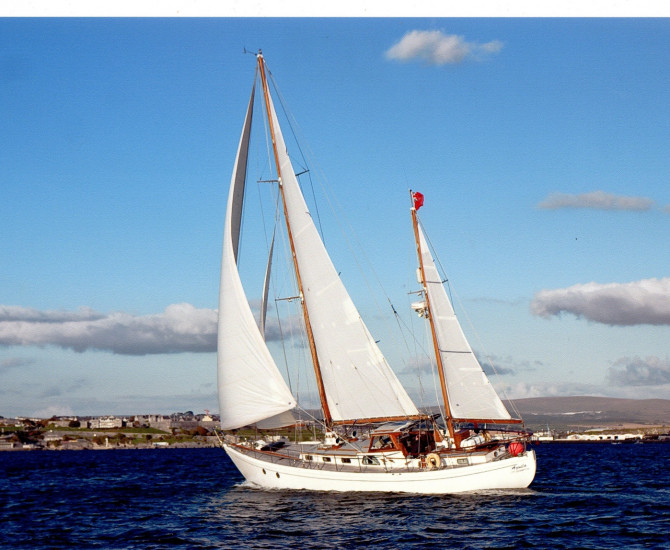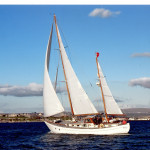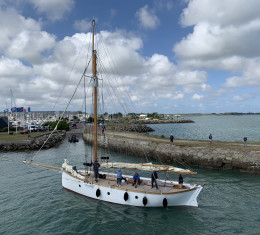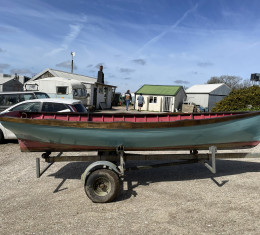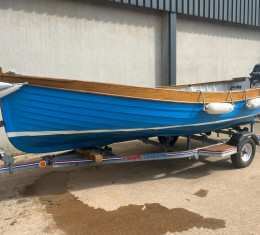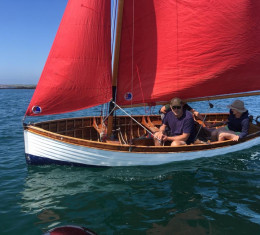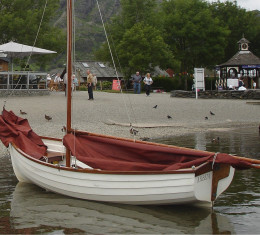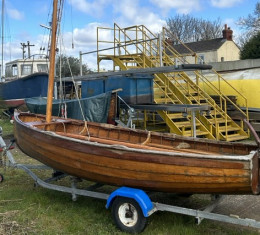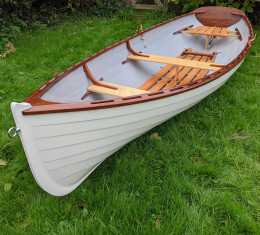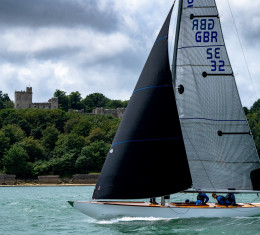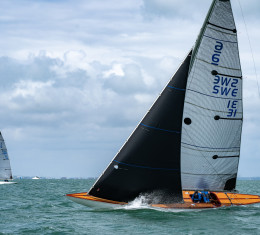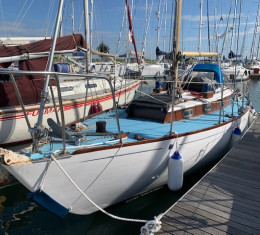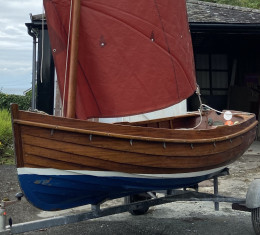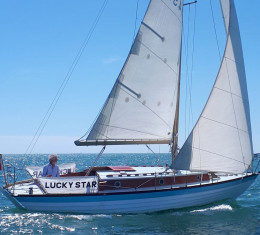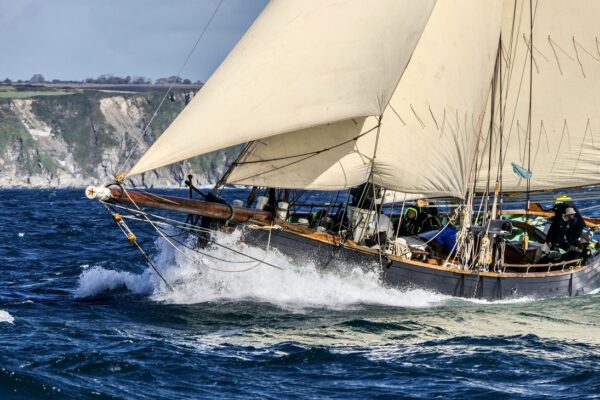Sailing yachts
Full specification
Wooden Ships Comments on this 28 Ton Hillyard Ketch
David Hillyard was the most successful boat builder in UK until the arrival of grp and mass boat construction.
Starting in 1920’s when yachting was becoming popular in the recovery period after the Great War, David Hillyard built little 2 ½ tonners of around 22’ – 24’. They were good little sea-boats, they were cheap and his reputation was established.
He developed his signature design after 1945 with the 9 tonner. This was a conventional long keeled yacht hull design but with a centre cockpit which allowed for an aft cabin in addition to the saloon cabin and the fore cabin.
A 30’ yacht with 2 separate sleeping cabins outside the saloon was a revolutionary design. Add a big deep centre cockpit and success was assured in the growing market for family sailing.
He introduced the bigger 36’ 12 tonner (all measurements in Thames Tonnage) with a few variations on the theme and there were several much bigger boats, including this one, the largest of his designs at 51’.
David Hillyard was a very canny builder. He adopted some build methods which were considered unconventional by the old school builders and was never afraid to introduce methods which would save money without compromising strength and safety. Unconventional he may have been but his designs and construction have stood the test of time and by far the majority of his yachts are still afloat and sailing today and in many corners of the world.
Many are the stories of his particular ways, some true, some undoubtedly mythical. He was a devout Chapel man, his boats were always supplied to the new owners with a Bible in the locker and over many years he has earned the respect of many devoted owners.
This particular boat is one of the biggest ever built by Hillyards at 28 Thames Tonnes, an enormous interior volume even for a 51’ yacht. The original owner was looking for a yacht with the luxury of space down below, acceptable performance and “a motion that enables life at sea to be a pleasure rather than an endurance test.” The split rig with a boomed staysail is designed to make life easy for a small crew, even when the weather becomes testing.
The boat was designed originally for comfortable family cruising, and today she is even more capable of fulfilling that role with the addition of modern equipment such as self tailing winches, roller furling headsail and a brand new Beta diesel with plenty of horse power, all contributing to the comfort and ease with which this boat can be sailed. She has been in the present ownership for over 30 years, in which time she has cruised extensively with a large family aboard and in more recent years with only a small crew (the children have all flown the nest!). She is capable of fast comfortable passages and will look after her crew in bad weather. The acres of deck space are superb in the summer months, while the addition of the open backed wheelhouse means there is shelter whatever the weather.
This is a boat perfectly capable of undertaking any blue water voyage although she is equally at home cruising around the coast in summer months. She is well equipped, has been well maintained, and the new engine this year means she is ready to go on doing what she has been doing for another 50 years.
Construction
Hull
Planked in 1 5/16” mahogany on heavy sawn oak frames with 3 steamed oak intermediate timbers. Copper rivet fastened to the steamed timbers and non-ferrous nails into the sawn frames. Hood ends and garboards all bronze screw fastened.
Iroko backbone, dead woods, stem and stern post.
Grown oak floors throughout most of the boat with some galvanised strap floors amidships.
External iron ballast keel with galvanised mild steel keel bolts, replaced new in 1996. Some internal lead trimming ballast.
Decks and cockpit
Yacht laid teak deck glued and secret nail fastened over a marine plywood sub deck, seams payed with butyl rubber. Scrubbed teak margin boards, cover boards and king plank. High toe rail all round.
Decks laid on pine deck beams fixed to a heavy pine beamshelf from stem to stern.
Stainless steel twin roller stem head fitting, galvanised fairleads and large galvanised bollard cleats fore and aft. Wide side decks and large open deck space forward of the coachroof make it easy to work the rig and move around.
Centre self draining cockpit with a solid open backed wheel shelter over the top, perfect for cruising in the UK climate. The cockpit cover completely encloses the cockpit and rolls up when not required. The cockpit is deep and safe with seating all round and the helm position set over to starboard. Superb visibility all round the boat and of the rig from the helm
Superstructure
Centre cockpit arrangement allows for a large aft cabin, therefore the boat has a fore and aft coachroof. All coachroof coamings in painted mahogany with bronze portholes. Sheathed plywood coachroof decks with varnished teak capping rail trim around the top edge and teak handrails.
Rig
Bermudan ketch rig, cutter headed with a boomed staysail.
Deck stepped varnished wooden masts in painted galvanised tabernacles. Wooden booms on both masts with slab reefing, the original roller reefing on the main has been abandoned in favour of the slab type reefing.
Twin spreader main mast with single cap shroud, single intermediate shroud and twin lowers. Inner forestay to the deck, outer forestay incorporated in the roller reefing. Split standing backstay.
Single spreader mizzen with a single cap shroud and twin lowers.
All rigging in stainless steel to s/s rigging screws and internal galvanised chainplates.
Winches
2 x Lewmar 34 ST on the main mast.
2 x Lewmar 30 ST on the mizzen.
2 x Lewmar 44ST cockpit primary sheet winches.
Lewmar 30 for reefing pennants.
Roller reefing furling line is wire to a captive drum winch on the coaming.
Sails
Full set of working sails, all in good condition and made by Hood Sails, including:
Main
Mizzen
Staysail
Genoa
Older sails, still in serviceable condition include:
Cruising chute
Spinnaker
Mizzen staysail
Storm trysail
Storm jib
Machinery
Engine
New Beta 75hp 4cyl diesel, installed 2014. Very smart and professional installation, engine has been sprayed white to match the engine room instead of the standard Beta red.
Borg Warner Velvet Drive hydraulic gearbox to centreline stainless steel shaft and a bronze Brunton H6 Auto Prop. Single lever Morse control at the helm.
6-7knots cruising speed, 9 knots max. Consumption unknown with new engine.
Belt driven Jabsco bilge pump off the engine, operated with a 12v electric clutch, and can be used via the fresh water inlet as a deck wash. Belt driven hydraulic pump for the anchor windlass.
Generator
Fischer Panda 4000, located on port side of engine room in an insulated box.
Batteries/Electrics
1 x 12v engine start battery
5 x 12v domestic batteries.
Charging from engine alternator or from C-trek chargers when either connected to mains or running generator.
Inverter for on board 240 volt supply when not connected to shore power, 240 volt sockets fitted throughout.
Tanks
Fuel – 2 x HDPE plastic Tek Tanks located under the saloon cabin sole with a total capacity of 160 gallons. Installed new in 2004.
Domestic water – 2 x HDPE plastic Tek Tanks under the saloon cabin sole, total capacity of 250 gallons. Installed new in 2004.
Accommodation
Berths
9 berths in total. Aft cabin with a large double. 4 singles in the forward cabin. A double and a single in the saloon.
Interior layout
Entrance to the saloon through the hatch from the cockpit. Steps down into the saloon with 6’6”+ headroom.
Galley to starboard and chart desk area to port. Passageway on the starboard side to the aft cabin.
Outboard on the passageway are storage lockers with entrance to the side of the engine room via a lifting hatch. Additional access to the engine room via a hatch beneath the companionway steps. The aft cabin has a large double berth athwartships with a separate heads compartment on the port side. Nice varnished mahogany joinery with plenty of storage around the cabin in lockers beneath the berth and under the deckhead. The berth can easily be folded up to provide a large dressing area. Hatch in the aft end for access to the steering quadrant and emergency steering system.
Main saloon is spacious because of the beam, finished with white painted bulkheads and varnished mahogany trim. Handrails all round at the coaming level.
U-shaped seating to starboard which converts to a double berth when required. Dropleaf varnished mahogany table with clever storage arrangements built in gives comfortable seating for 8-9 people with the extra leaf added in. Extra table doubles as a cockpit table.
Single settee berth to port, storage shelf behind against the hull plus large lockers beneath.
Eberspacher diesel fired hot air heating system fitted in the engine room provides heating to all areas of the boat.
Passageway offset to port goes forward. Large built in mahogany drawer unit on the port side under the deck head with hanging space above. Heads compartment to starboard.
Door into the forward cabin which has a huge cabin sole and masses of headroom. 4 single berths here, 2 on each side. The upper two berths were removed many years ago and replaced with comfortable pipe cots as the fixed berths were not required. Hull sides finished with mahogany slats which allow good ventilation. Chrome portholes in the topsides for light and ventilation.
Door going forward into the forepeak which is a large storage area. Ample space for fenders, warps, dinghies and spares. Forehatch above for easy access.
Heads
Both fore and aft heads compartments have Baby Blake sea toilets.
Forward heads pumps either into a waste tank or directly overboard. Shower with pressurised hot and cold water (pumped into grey tank) and teak shower grating.
Shower also in the aft cabin heads which is pumped directly overboard.
Galley
Galley positioned in the aft starboard corner of the main cabin.
Twin stainless steel sink with pressurised hot and cold water plus manually pumped fresh (through a water filter) and salt water taps. Waste water pumped to the grey tank and then pumped overboard.
Shipmate 3 burner gimballed gas stove with oven and grill set outboard. Plenty of storage lockers around the galley for food and equipment. Fully certificated and protected gas system. 12 volt spacious refrigerator with small freezer compartment.
Equipment
Navigation
Sestral steering compass
B&G sounder
B&G log
Simrad DSC VHF
Garmin GPs Map 5012
Neco Pinta Autopilot
Garmin sonar
Garmin AIS
Navtex
Seafarer loud hailer
Barograph
Lead line
Safety
8 man RFD liferaft
Jotron auto danbuoy
2 horse shoe life buoys
4 lifejackets with lights
5 harnesses and lifelines
1 child harness
6 fire extinguishers and a fire blanket.
2 search lights
Ground tackle
Bruce anchor 50kg
Fishermans anchor 50lb
CQR anchor 50lb
80m of ½” galvanised chain
25mm anchor warp
Other
Maxxon 3m inflatable dinghy
Yamaha 9.9hp outboard
Multiplait warps including
6m x 22mm
6m x 20mm
18m x 12mm
18m x 17mm
20m x 20mm
22m x 22mm
31m x 20mm
10 fenders
2 boarding ladders
Helmsman’s seat
Cockpit table (serves as extension to saloon table)
Rigging spares (NOT SURE WHAT THESE ARE??)
Deck brushes and hose
Sun awning
Star mooring hook
Heaving lines
Disclaimer:
These particulars have been prepared in good faith from information provided by the Vendors and are intended as a guide, Wooden Ships cannot guarantee or warrant the accuracy of this information nor warrant the condition of the vessel. The Purchaser should instruct his agent or surveyor to validate all details as necessary and satisfy himself with the condition of the vessel and its equipment.
Wooden Ships classic yachts brokers have an extensive database of boats for sale. With a wide range of sailboats, classic yachts, motor yachts and small classic boats, Wooden Ships has one of the largest selections of traditional wooden boats and yachts for sale in the UK.
Disclaimer:
These particulars have been prepared in good faith from information provided by the Vendors and are intended as a guide, Wooden Ships cannot guarantee or warrant the accuracy of this information nor warrant the condition of the vessel. The Purchaser should instruct his agent or surveyor to validate all details as necessary and satisfy himself with the condition of the vessel and its equipment.

